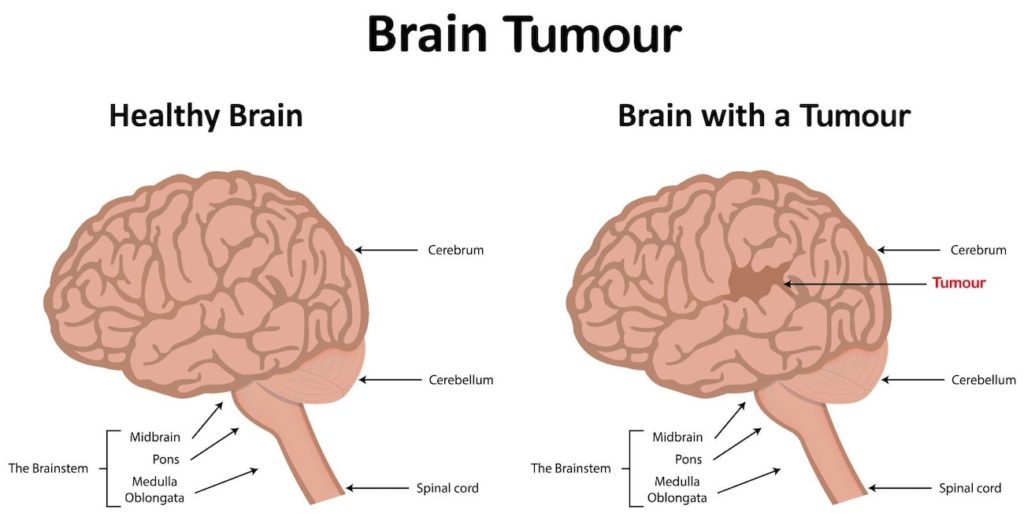A brain tumour, also known as an intracranial tumour, is an abnormal mass of cells in the brain that can either be cancerous (malignant) or non-cancerous (benign). Both types of tumours grow in size within a confined rigid skull box and build up the pressure inside the skull.
If left untreated, the increased pressure can cause life-threatening brain damage. The growth rate of a brain tumour is widely variable, entirely based on the underlying tumour type. The severity and clinical presentations of brain tumours depend on the tumour location, size and type of tumour.
There are two main types of brain tumours — primary and secondary brain tumours.
The tumour arising from any brain tissue or its membrane or nerve fibres are called primary brain tumours. Depending on the type of primary tissue, the rate of growth is very varied. Some tumours are aggressive and fast-growing, while others grow relatively slower. Glioma is the most common type of primary brain tumour with a poor prognosis due to its aggressive nature of growth and spread within the brain parenchyma tissue.
The tumour cells usually cancer from other body tissue outside the brain, spread via the bloodstream and seeding in the brain are called metastatic tumours or secondary brain tumours. Not all cancers can reach to brain. But, breast, lung, skin and colon cancer are the most common metastasis tumours in the brain.
The exact cause of brain tumours is unknown. There are some hypotheses about mutation in a cell’s DNA that results in the rapid division and growth of these cells. These abnormal cells steal blood supply from the underlying normal healthy cells and change the surrounding tissue, weakening the body’s immune system and its blood supply.
The rapid growth of abnormal tumour cells cause a mass effect of surrounding healthy cells and compromise their blood supply with compression, inflammation and subsequent damage to surrounding cells and developed brain swelling, raised pressure inside the brain, which eventually leads to the patient’s death.

The well-known risk factor is radiation exposure to the brain. Other risk factors are:
There are no exact risk factors that relate brain tumours to certain types of food and the use of handheld devices, such as handphones.
The most typical symptom of brain tumours are headaches, feelings of nausea and vomiting in the early morning. Some specific symptoms are experienced in relation to the location and size of the tumour in the brain:
If you have such unexplained symptoms, you should see a doctor. Your doctor can evaluate your symptoms and make an appropriate referral to a neurosurgeon for further evaluation and investigations to rule out brain tumours. Having an early diagnosis is very important for the management of brain tumours.
Please relax and see the neurosurgeon. The doctor will first obtain a thorough understanding of your symptoms and personal and family medical history. After which, he will correlate his clinical findings by doing a detailed neurological examination.
He will then arrange various investigations based on these findings, such as MRI or CT brain scans, to confirm or rule out the causes.
Subsequently, the doctor will explain these findings and investigations, and the possible treatment options. Rest assured, your doctor will work with you to develop a treatment plan best suited to your condition.
Patient history and a physical examination are fundamental steps in diagnosing a brain tumour.
Imaging studies and subsequent histological examinations (examination of tissue samples with specific stains) are essential to confirm the diagnosis.
Some of these imaging studies are:
A basic imaging study used to diagnose a brain tumour. A gadolinium-based dye or contrast is administered via IV for the test, enhancing and improving the clarity of the MRI scans.
Mainly for the diagnosis dilemma if the lesion is not confirmed by MRI brain scan alone. Useful for exclusion of radiation effect of brain or infection.
A functional MRI is a more sophisticated imaging study done before an operation that helps clarify the location of the tumour with the important functional areas in the brain.
Mainly for the follow-up studies related to treatment and to examine changes in the tumours.
It is a navigation scan to help the surgeon during an operation. The scan provides the neurosurgeon with the exact location of the tumour and the important structures that surround it.
Both imaging tests are important in assessing the blood supply and the relationship of the tumour to major blood vessels and venous sinuses in the brain.
A PET scan is very useful for studying the metabolic activity of tumours and the normal healthy cells in the body. Actively growing tumour cells can be picked up by the scan and localise their position. This test is mainly used to monitor tumours after treatment.
With advancements in technique, technology and sophisticated imaging, brain tumours can be cured. However, this ultimately depends on a variety of factors such as the type and grade of the tumour, its size and location, and other medical conditions the patient may have.
The majority of benign brain tumours can successfully be treated with surgery, radiation or medication like chemotherapy. Some malignant brain tumours can be well controlled with a combination of modern treatments, giving the patient chances of a good quality of life.
Brain tumours can be treated in 3 main ways: Surgery, Radiation and Chemotherapy.
Surgery is a mainstay of treatment and diagnosis of brain tumours. Traditionally, open surgery is performed to evacuate the brain tumour. However, technological advancements have helped the current neurosurgical practice diagnose and treat tumours via keyhole approach/ minimally invasive approaches.
A minimally invasive (keyhole) approach or endoscopic surgery is a less destructive alternative to open brain surgery and has transformed how brain tumours are treated. It allows neurosurgeons to identify and treat conditions within the brain with reduced risk and faster recovery. It has become a standard approach in treating certain types of tumours, depending on the type and location.
Either single or fractionated radiotherapy can be used to effectively control certain types of brain tumours including benign brain tumours. Different types of radiation such as Gamma Rays or Proton Beams are available in Singapore for the treatment of brain tumours.
Different types of medication, either orally or administered via injections, are available for treatments of brain tumours. The type of medication and the duration of the treatment is always prescribed by a specialist (neuro-oncologist).
Nowadays, immunotherapy is available for certain types of tumours. This involves stimulating the body’s immune system to destroy the cancer cells. The treatment may be used in combination with other therapies, depending on the type and size of the tumour.
While getting diagnosed with a brain tumour can be scary, it is important to get diagnosed as early as possible to increase your chances of successful treatment. If you are experiencing any of the symptoms associated with brain tumours, please do not hesitate to see a doctor as soon as possible. Your doctor will be able to accurately diagnose your condition and find a treatment method that is best suited to your needs.
In addition, they may be able to provide you with the resources needed to cope with such a diagnosis, such as ways you can learn more about this condition, or support groups where you can meet other people with similar conditions.

Senior Consultant
Neuro & Spine Surgeon
MBBS, MSc Surgery, MRCS (Edin),
MMed. Sc (Gen Surg) (S'pore),
FRCS. Surgical Neurology (UK)
Dr Sein Lwin is an experienced Senior Consultant Neuro & Spine Surgeon and the Neurosurgical Director at the Advanced Brain and Spine Surgical Centre.
He is highly experienced in spine surgery and in minimally invasive approaches for spinal cord tumours and degenerative spine surgery. His specialised interests lie in endoscopic endonasal and open skull base surgery, pituitary tumours, vascular surgery, cranial nerve disorders and peripheral nerve conditions.
Many neurological conditions may require urgent attention. If you require immediate care, please contact us.
Contact Us For More Information
Your needs are important to us.
For enquiries, leave a message and our friendly team will get in touch with you.
Monday – Friday: 9:00AM – 5:00PM
Saturday: 9:00AM – 12:30PM
Sunday & Public Holiday: Closed
We provide quality specialised care for neuro and spine conditions.
For enquiries, leave a message and our friendly team will get in touch with you.
Monday – Friday: 9:00AM – 5:00PM
Saturday: 9:00AM – 12:30PM
Sunday & Public Holiday: Closed
© 2023 All Rights Reserved | Advanced Brain & Spine Surgical Centre | Terms & Conditions